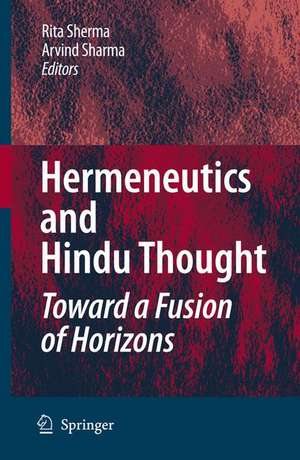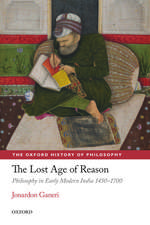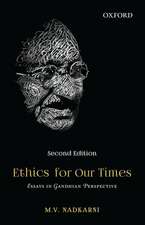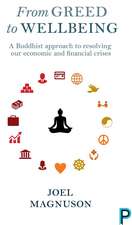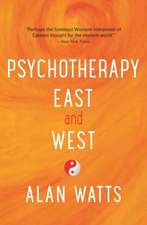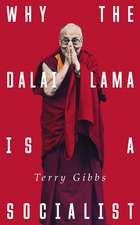Hermeneutics and Hindu Thought: Toward a Fusion of Horizons
Editat de Rita Sherma, Arvind Sharmaen Limba Engleză Hardback – 3 iun 2008
Applications of interpretive methodologies conditioned by Western culture to classify Indian thought have had important impacts. Essays by Sharma, Bilimoria, Sugirtharajah, and Tilak examine these impacts, offering alternate interpretive models for understanding Hindu concepts in particular and the Indian religious context in general.
Several essays offer original insights regarding potential applications of traditional Hindu philosophical principles to cross-cultural hermeneutics (Long, Bilimoria, Klostermaier, Adarkar, and Taneja). Others engage Hindu texts philosophically to elicit deeper interpretations (Phillips, and Rukmani). In presenting essays that are both critical and constructive, we seek to uncover intellectual space for creative dialectical engagement that, we hope, will catalyze a reciprocal hermeneutics.
| Toate formatele și edițiile | Preț | Express |
|---|---|---|
| Paperback (1) | 638.76 lei 43-57 zile | |
| SPRINGER NETHERLANDS – 19 oct 2010 | 638.76 lei 43-57 zile | |
| Hardback (1) | 644.95 lei 43-57 zile | |
| SPRINGER NETHERLANDS – 3 iun 2008 | 644.95 lei 43-57 zile |
Preț: 644.95 lei
Preț vechi: 758.77 lei
-15% Nou
Puncte Express: 967
Preț estimativ în valută:
123.41€ • 129.20$ • 102.11£
123.41€ • 129.20$ • 102.11£
Carte tipărită la comandă
Livrare economică 07-21 aprilie
Preluare comenzi: 021 569.72.76
Specificații
ISBN-13: 9781402081910
ISBN-10: 140208191X
Pagini: 249
Ilustrații: XII, 250 p.
Dimensiuni: 155 x 235 x 16 mm
Greutate: 0.54 kg
Ediția:2008
Editura: SPRINGER NETHERLANDS
Colecția Springer
Locul publicării:Dordrecht, Netherlands
ISBN-10: 140208191X
Pagini: 249
Ilustrații: XII, 250 p.
Dimensiuni: 155 x 235 x 16 mm
Greutate: 0.54 kg
Ediția:2008
Editura: SPRINGER NETHERLANDS
Colecția Springer
Locul publicării:Dordrecht, Netherlands
Public țintă
ResearchCuprins
The Hermeneutics of the Word “Religion” and Its Implications for the World of Indian Religions.- Max Müller and Textual Management: A Postcolonial Perspective.- Being and Text: Dialogic Fecundation of Western Hermeneutics and Hindu M?m?ms? in the Critical Era.- The Hermeneutic Circle and the Hermeneutic Centre.- C?turdharmya: Hermeneutics of Integrative Differentiation.- Psychological Growth and Heroic Steadfastness in the Mah?bh?rata.- Value Ethics in the Early Upani?ads: A Hermeneutic Approach.- Engagement with Sanskrit Philosophic Texts.- Truth, Diversity, and the Incomplete Project of Modern Hinduism.- The Other of Oneself: A Gadamerian Conversation with Gaud?ya Vaisnavism.- Concluding Remarks.
Recenzii
From the reviews:
“The edited collection on hermeneneutics and Hindu thought brings contributions from scholars covering Indian studies, hermeneutics, comparative religion as well as cross-cultural studies. … I therefore strongly believe the book on hermeneutics and Hindu thought will vitally contribute to the various sediments of uncritical and ethnocentric uses of hermeneutics in humanities and social sciences at large.” (Lenart Skof, Sophia, Vol. 48 (4), 2009)
“This present volume uses Hans-Georg Gadamer’s concept of the ‘fusion of horizons’ by engaging Hindu hermeneutical philosophies and theologies … and by exposing wrong-minded Western interpretations of India. … It must be aimed at scholars already working on Indian thought. … the volume is an important contribution to Hindu studies, not only representing those who apply a more sensitive hermeneutic when reading Indian texts, but offering powerful insights as to how this can be accomplished further.” (Jonathan Edelmann, Journal of Hindu Studies, Vol. 4 (2), July, 2011)
“The edited collection on hermeneneutics and Hindu thought brings contributions from scholars covering Indian studies, hermeneutics, comparative religion as well as cross-cultural studies. … I therefore strongly believe the book on hermeneutics and Hindu thought will vitally contribute to the various sediments of uncritical and ethnocentric uses of hermeneutics in humanities and social sciences at large.” (Lenart Skof, Sophia, Vol. 48 (4), 2009)
“This present volume uses Hans-Georg Gadamer’s concept of the ‘fusion of horizons’ by engaging Hindu hermeneutical philosophies and theologies … and by exposing wrong-minded Western interpretations of India. … It must be aimed at scholars already working on Indian thought. … the volume is an important contribution to Hindu studies, not only representing those who apply a more sensitive hermeneutic when reading Indian texts, but offering powerful insights as to how this can be accomplished further.” (Jonathan Edelmann, Journal of Hindu Studies, Vol. 4 (2), July, 2011)
Textul de pe ultima copertă
The emergence of Hinduism as a field of study in the Western academia coincides with the development of modern hermeneutics. Despite this coemergence, and the rich possibilities inherent in a dialectical encounter between the theories of modern and pre-modern hermeneutics and those of Hindu hermeneutical traditions, this potential has not been tapped within the boundaries of religious studies. This volume sets out to initiate such an interface.
Some essays in this volume, such as those by Shrinivas Tilak, Sharada Sugirtharajah, and Purushottama Bilimoria examine the impact of Western hermeneutics on the Indian religious landscape. Others, just as those by Jeffrey Long, Klaus Klostermaier, Aditya Adarkar and Leena Taneja, offer insights into traditional Hindu philosophical principles and into concepts pertaining to cross-cultural hermeneutical frameworks. Still others, such as those by Stephen Phillips and T.S. Rukmani, are concerned with the application of a philosophical approach to hermeneutical engagement with Hindu texts, in order to arrive at a more comprehensive interpretation. An introduction by Rita Sherma and a conclusion by Arvind Sharma book-end the volume.
Some essays in this volume, such as those by Shrinivas Tilak, Sharada Sugirtharajah, and Purushottama Bilimoria examine the impact of Western hermeneutics on the Indian religious landscape. Others, just as those by Jeffrey Long, Klaus Klostermaier, Aditya Adarkar and Leena Taneja, offer insights into traditional Hindu philosophical principles and into concepts pertaining to cross-cultural hermeneutical frameworks. Still others, such as those by Stephen Phillips and T.S. Rukmani, are concerned with the application of a philosophical approach to hermeneutical engagement with Hindu texts, in order to arrive at a more comprehensive interpretation. An introduction by Rita Sherma and a conclusion by Arvind Sharma book-end the volume.
Caracteristici
Highlights the interpretive dimension of religion (Hinduism) and the religious dimension of interpretation (Western hermeneutics) Seeks transcultural value in Hindu resources of hermeneutics, and presents Hindu thought in a new light by recontextualizing it with Western hermeneutics Contains contributions conceiving of new interpretive angles, new connections, and potential relationships that take into full consideration the differences inherent in Indian and Western intellectual cultures Opens up the possibility that Hinduism may be more than just a religion to be studied Enriches our understanding when elucidated and elaborated as a theme in the hermeneutical tradition
